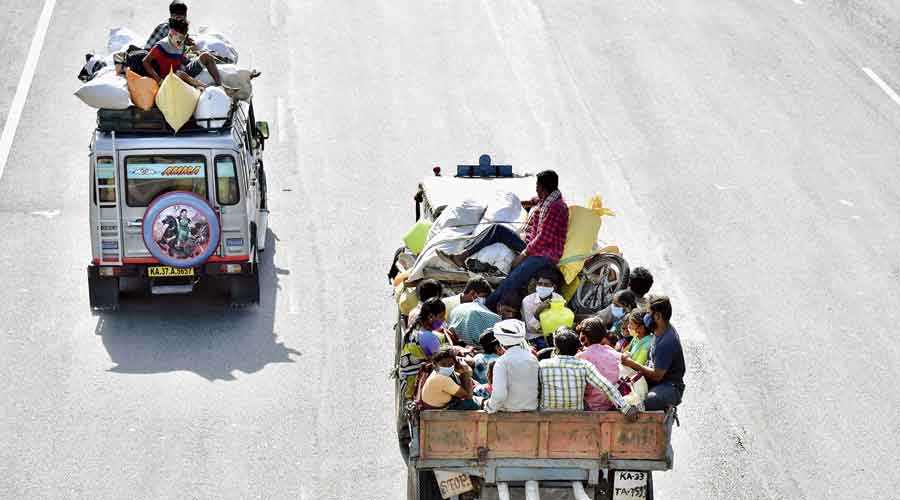Thirty-four lakh salaried Indians lost their jobs in April as small and medium enterprises struggled to survive, unable to withstand the Covid second wave at a time they had not fully recovered from the pandemic’s first wave.
According to the Centre for Monitoring Indian Economy (CMIE), a private research group, a total of 73.5 lakh jobs were lost in April, the unemployment rate rising to 7.97 per cent from 6.5 per cent in March.
CMIE managing director Mahesh Vyas said the lockdowns and economic slowdown had devastated small enterprises in the rural areas.
“Last year, the economy suffered a major shock. Before it fully recovered, the second wave of Covid caused significant shock yet again,” Vyas said.
“If the economy bounces back very quickly and robustly, these enterprises may come back to life. But the outlook does not appear promising now.”
India had 38.877 crore employed people at the end of December 2020, counting both the organised and unorganised sectors. The number rose to 40.07 crore by January-end but fell to 39.821 crore by February, 39.814 crore by March and 39.079 crore by April-end.
Some 28.4 lakh salaried jobs were lost in the rural areas and 5.6 lakh in the cities, reducing the number of salaried employees from 4.6 crore in March to 4.544 crore in April.
In the villages, the number of the salaried fell from 3.324 crore in February to 3.072 crore in March and to 2.788 crore in April.
‘Deeper crisis’
Labour economist and retired JNU professor Santosh Mehrotra said the share of the lost salaried jobs among the total jobs lost was very high, and represented a “deeper crisis”.
“A section of the 73.5 lakh people who lost their jobs (in April) were agricultural workers who had just finished harvesting. They will resume working once the sowing season starts in June,” Mehrotra said.
“But the 34 lakh who lost their salaried jobs are in a deeper crisis. They worked in small and medium industries that have closed their operations. Many of these units are unlikely to revive amid the economic slowdown.”
One of those left in the lurch is Ullash Kumar, a native of Jharkhand’s Giridih district who worked in a factory on Pune’s outskirts that produces AC and generator parts.
As the second wave of Covid struck, the factory suspended work and Kumar returned home in April. The father of two small children has had no employment since then and has exhausted his savings.
“I worked as a machine operator. There’s no work here that matches my skills. We have no land, either. I have had to borrow money for my family’s daily expenses,” Kumar said.
Mehrotra said the State of Working India 2021 report, released by the Azim Premji University, had found that after last year’s lockdown, the suddenly unemployed workers had taken up occupations more precarious and informal than their earlier jobs.
“The situation will now be the same for the nearly 34 lakh salaried workers who have lost their jobs,” he said.
Govt options
Vyas said the government ought to recognise the problem of job loss to be able to find a solution.
“The first thing for the government is to recognise that there have been job losses; only then can corrective actions be initiated,” he said.
Mehrotra said the second wave might affect economic activities for the next two or three months, and underlined that there’s already talk of a third wave.
“The economic losses suffered in 2020-21 are unlikely to be recovered in 2021-22. So the option available before the government is to borrow and spend on public infrastructure and employment-generation,” he said.
Mehrotra said India’s post-Covid fiscal stimulus in 2020-21 was 2.2 per cent of the GDP while a comparable economy like Brazil devoted 12 per cent of its GDP for the purpose.
“The government’s actual allocation for the health sector for 2021-22, if you remove the allocation for Covid management, is less than what it allocated last year,” he said.
“The government should borrow and spend on the health infrastructure and an urban employment programme, and also send a certain amount of money directly to the bank accounts of the vulnerable population.”
Several states have already enforced lockdowns, increasing the possibility of job losses in the next few months. The central trade unions have demanded that the Centre compensate the workers for the period they remain jobless because of the Covid situation.
“Private employers are not paying any compensation to the workers. The government must provide them compensation,” said Ashok Singh, vice-president of the Congress-affiliated Intuc.
The State of Working India report estimates that the Covid first wave reduced workers’ earnings and pushed the families of 23 crore Indians into poverty.
It says about 10 crore people became freshly unemployed during the nationwide April-May lockdown last year. Most of them were back at work by June but by the end of last year, about 1.5 crore of them still remained jobless.
The report has recommended additional government support to compensate the workers for their lost jobs and also offset the anticipated impact of the second wave.











